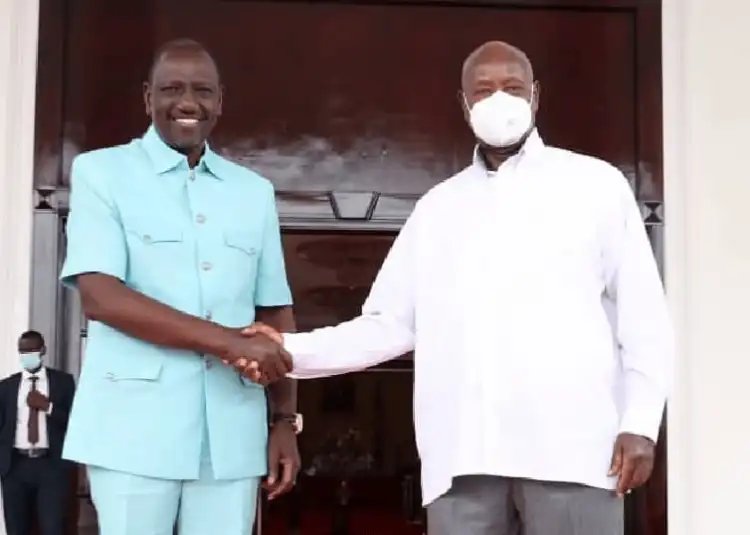Uganda Shifts Focus to Tanzania for Oil Imports Amid Dispute with Kenya

Uganda is nearing a deal with Tanzania to reroute its main sea route for oil imports, opting to establish a refined petroleum products pipeline from Tanga port to Kampala. This decision follows a fallout between President Museveni and Kenyan President William Ruto over Kenya’s move to block Uganda from using its oil pipeline. Negotiations between Uganda and Tanzania are advancing, with technical teams working to make the Tanzanian route cost-effective and efficient.
The Ugandan government is in the final stages of re-directing her main route to the sea and the importation of petroleum products through Tanzania, including establishing a refined petroleum products pipeline from Tanga port to Kampala.
Permanent Secretary, Ministry of Energy Ms Irene Batebe was quoted by the government-owned newspaper The New Vision as confirming that negotiations were ongoing and decision would be announced soon.
“We are in the middle of negotiations,” she said.
“A concrete decision on the Tanzanian route will be announced when these negotiations are over. I am careful to say that we are rebooting. Without a doubt the Kenyan route has always been critical, but of course because of the challenges we are facing, we are looking for alternatives and in the coming days, government will officially give its position on this matter,” The New Vision reported.
The negotiations between Uganda and Tanzania are in advanced stages in Dar es salaam to divert oil imports for Uganda through Dar es Salaam, and theme efforts came in the wake of a fall out between President Yoweri Museveni and his Kenyan counterpart William Ruto following the Kenyan government move to block Uganda from using the Kenyan oil pipeline, after the latter changed her Energy laws that kicked out Kenyan middle-companies from importing petroleum products for Uganda.
Sources have intimated that a select Ugandan technical team has already spent a week in Dar es Salaam working with its Tanzanian team to figure out the immediate workable solutions of making the Tanzanian route as cost effective and efficient as the Kenyan route.
The team is also discussing with relevant authorities in Tanzania on how to plan for the establishment of pipeline for refined petroleum products along the already secured corridor between Kampala and Tanga in Tanzania. Sources say that Uganda and Tanzania are in the final stages of reaching an agreement to add the petroleum products pipeline alongside that of crude oil on the right of way corridor, which has already been secured under EACOP project.
Ms. Batebe according to the New Vision, confirmed they had a team in Tanzania but declined to discuss further details about the negotiations the team that has already spent one week in Dar es Salaam had accomplished.
“You know we are always in our neighbouring country for so many things,” she is quoted as saying.
In January this year, Nankabirwa revealed that Uganda was moving to Tanzania for oil imports after Kenya blocked Uganda National Oil company (UNOC) which is Uganda’s national oil marketer and also operates in Kenya from using its pipeline to handle its oil imports through Mombasa Port. The minister said the frustration by Kenya was threatening the countries fuel supply stability.
The Minister then tabled a Bill that empowers the Uganda National Oil Company Ltd (UNOC) to be the supplier of all imports to the licensed oil marketing companies of petroleum products in the country.
President Yoweri Museveni would later defend the MEMD move and in a letter posted on X formally Twitter, on November said the move was designed to lock out what he termed as middlemen and lower pump prices in Uganda.
The President insisted that there was no reason why Ugandan oil marketing companies should continue buying petroleum products from middlemen in Kenya.
“A whole country buying from middlemen in Kenya or anywhere else! Amazing but true. Why not buy from the refineries abroad and transport through Kenya and Tanzania, cutting out the cost created by middlemen?” he said.
According to Museveni, Uganda had been paying more to the middlemen on every imported ton of diesel, petrol, and Kerosene, and he wanted the tendency to buy from Kenyan suppliers stopped.
President Museveni said UNOC a new role would act as stop-gap measures as the country looks forward to its proposed new petroleum refinery in a few years that would guarantee the country competitive petroleum products, free of distributions caused by middlemen.
However, in November last year, High Court in Kenya issued a conservatory order stopping the issuance of an Oil Importation license to UNOC, following a petition by three parties including Royani Energy Limited, John Kinuthia Mwangi and Acacia Ridge Construction who claimed they were interested parties but Kampala is more that convinced that was stage-managed by Ruto’s administration to frustrate Uganda quest for energy independence.
According to reliable sources, Kampala’s argument that all the frustrations and sabotage are deliberate is amplified by the comments made on 23rd November 2023 by President Ruto’s chief economic Advisor Dr David Ndii on his X (Former twitter) handle that Uganda will only succeed to import oil products to her country if and only if, it can fly it in. “Will Uganda fly the fuel to their country? He asked…!!
This was immediately after the Uganda cabinet had just passed a resolution to detach itself from Kenya’s oil supply system. This quote was interpreted by Kampala as a true testimony that Nairobi is determined to work overtime to ensure that Uganda doesn’t use Kenyan territory to execute her deal.
In January this year, Uganda dragged Kenya to the East African Court of Justice seeking a declaration that its action of prohibiting the Energy and Petroleum Regulatory Authority (EPRA) from issuing a petroleum import licence to UNOC was illegal.
Attorney General Kiryowa Kiwanuka argues that reliance and dependence on Kenyan oil marketing companies to import and supply petroleum products to Uganda has exposed Uganda to supply vulnerabilities resulting in avoidable increases in fuel pump prices.







